
The Best e-Commerce Apps in 2024

As of today, there is a relatively small number of experts and professionals in the field of internet advertising who know how to connect offline and online markets. However, in today's realities, they face an even more challenging task: integrating offline, online, and the mobile app market. In this article, we will discuss types of e-Commerce applications, but first, let's remind ourselves what e-commerce is.
The Best e-Commerce Apps in 2024
E-Commerce
E-commerce is the sector of the economy that encompasses all financial and trade transactions conducted through computer networks, and the business processes associated with such transactions.
In other words, it is the buying or selling of something over the Internet.
From the perspective of business owners, manufacturers, and suppliers, e-commerce involves promoting and providing their goods or services over the Internet. From the perspective of customers (clients), it involves browsing, selecting, comparing, and ordering these services or goods.
Customer interest in remote interaction with sellers continues to grow. The most popular method of selling services or goods remains the internet store/platform, typically developed in the form of a website. However, every business must evolve and improve, keeping pace with modern technologies and consumer needs. To not only retain but also multiply their target audience and competitiveness, many companies are releasing mobile applications in addition to their primary platform/website.
Depending on the interacting parties (business, consumer, administration), the following types of e-Commerce and their applications can be distinguished:
- Business to Business (B2B)
- Business to Customers (B2C)
- Customers to Customers (C2C)
- Customers to Business (C2B)
Interesting Fact
According to statistics, internet users spend at least 7 hours a day consuming content in online media. Of these 7 hours, approximately 108 minutes are spent specifically on mobile devices.
According to BusinessofApps, the revenue from mobile e-commerce reached $3.56 trillion in 2021. This accounts for over 50% of the total e-commerce sales volume. According to experts from Adjust (an app analytics service), in 2021, compared to the previous year, the number of installations of e-commerce applications on mobile devices increased by 12%. These figures indicate that the demand for e-commerce apps is steadily growing, and it seems that this trend in the market is not going to slow down.
Types of e-Commerce and Their Applications
E-commerce software comes in three types: open-source (free), closed-source (paid), and hosted solutions.
- Open-source software is deployed by the entrepreneur themselves and requires configuration and maintenance by them.
- Closed-source e-commerce platforms are paid, but you don't need to worry about maintaining the platform yourself; the provider handles all of that for you.
- Hosting means that your e-commerce website runs on a server owned by your provider.
The main types of e-commerce software are open-source and closed-source. Closed-source e-commerce platforms are paid but are generally easier to customize and maintain because the provider takes care of everything for you.
Business to Business (B2B)
This type of e-commerce operates on a "from business to business" principle. It occurs when one company provides its services or goods to another company, not to ordinary consumers.
Example: A candy manufacturer purchases sugar from another manufacturing company to produce its own products.
Business to Customers (B2C)
B2C is a type of e-commerce where a company provides its goods and services directly to the end-user.
Example: A candy manufacturer sells candies directly to consumers.
Customers to Customers (C2C)
C2C is a type of e-commerce where one consumer sells goods (that they do not produce themselves) directly to another consumer.
Example: A consumer buys candies and resells them to other consumers (a bright example is a resale platform). The manufacturer is not involved in this process.
Customers to Business (C2B)
This type of commerce is the direct opposite of B2C, as in this case, the consumer provides services/goods to the business.
Example: An individual makes handmade candies (craft) but sells them not to consumers but to an online store. The store immediately pays the cost of the goods to this individual and interacts with customers.
For each of these types, it is possible to create a mobile application with its unique functionality and design. The main goal of such an application should be to attract new customers, retain existing ones, and increase profits/sales. To achieve this goal, both the client and the developer must remember that each application must meet the interests and demands of the consumer, as well as be user-friendly and intuitive.
There are two options - a native iOS app or a hybrid one (for Android and iOS platforms). Why is that? Online stores target a financially capable audience, and that's logical. According to analysts, Android is the largest OS with a market share of over 70%. iOS is in second place - about 25%. However, despite such a significant difference, the iOS audience is more financially capable.
How to Choose an e-Commerce Platform
Choosing the right eCommerce platform is crucial to your company's success. If you're willing to invest in software that doesn't meet your needs, it could mean losing business and money.
Here are some things to consider when choosing an eCommerce platform:
- What kind of website do I want? Do I want a marketplace like Amazon or Etsy, where other sellers offer their products alongside mine? Or do I want to develop my own unique storefront from scratch?
- How much time should I dedicate to managing my website on a daily basis? If you're running a one-person show and don't have a lot of resources, consider using an easy-to-use drag-and-drop interface designed for those with limited technical abilities (like Shopify). If you're looking for something more customized or complex, consider platforms that offer more options through back-end coding.
The good news is that there are several types of e-commerce platforms that allow entrepreneurs like you more flexibility when building your online business.
TOP-5 E-Commerce Apps
Next, we want to share with you a list of 5 innovative e-commerce programs that users can use to purchase products or order services. Some of these programs function as sales platforms or help users discover new products.
Salesforce

Salesforce Commerce Cloud is a platform for cloud commerce. Users can create an intelligent shopping experience for their customers by integrating all their sales channels (mobile users, social media platforms, your online store, brick-and-mortar store, etc.) so that you can manage all business in one place. With so many available features and tools, entrepreneurs can strengthen brand loyalty and link their trade with all the following areas of their business:
- Sales
- Customer Service
- Marketing
- Developing your community
- Order fulfillment
In general, Salesforce Commerce Cloud offers a comprehensive solution for everyday e-commerce business management. You can establish an online presence relatively quickly and expand your business to reach more customers.
Advantages
Users can browse an extensive list of reliable partners and download all kinds of applications to create a platform that complements your business model. With over 4,000 pre-integrated apps available in the Salesforce store, you'll have everything you need to work!
- If you're serious about content marketing, integrate Commerce Cloud with your existing content management system. The transition is quite smooth, and you can control everything with the convenience of one foolproof place!
- Develop and launch a mobile app to promote your business.
- Take advantage of their "Inventory Availability Service." This provides inventory levels across all sales channels. So, you and your customers can see which products are available and where - how convenient is that?!
- Optimize the sales funnel for the best results. Increase the conversion rate using Salesforce's "proven cutting-edge methods." This includes: saved carts, pre-optimized checkout flows, and their payment accelerators.
- Don't neglect the mobile audience: master the art of mobile commerce with all the features offered by Salesforce. For example - responsive design, data-driven mobile UX, and one-touch payments. All of this is great for ensuring a seamless sales process for your mobile users.
- You can empower your customer service team to process orders on behalf of your potential customers (this is helpful for customers who prefer to place orders over the phone).
- Maximize organic traffic: rank higher in search engine results and attract traffic through SEO optimization; You can use Salesforce tools to find reasonable keywords that your customers are already searching for. They make it easy to optimize your product pages, product categories, metadata, and images, of course, this works wonders for improving overall reach.
Disadvantages
- It takes a lot of time and effort to understand how to use all the software in its entirety, this is especially true when it comes to configuring Salesforce APIs to create your own functions.
- There are some complaints about the cost. Overall, it's more expensive than products and services offered by competitors. Thus, this program is better suited for companies with a large turnover of money.
Prices
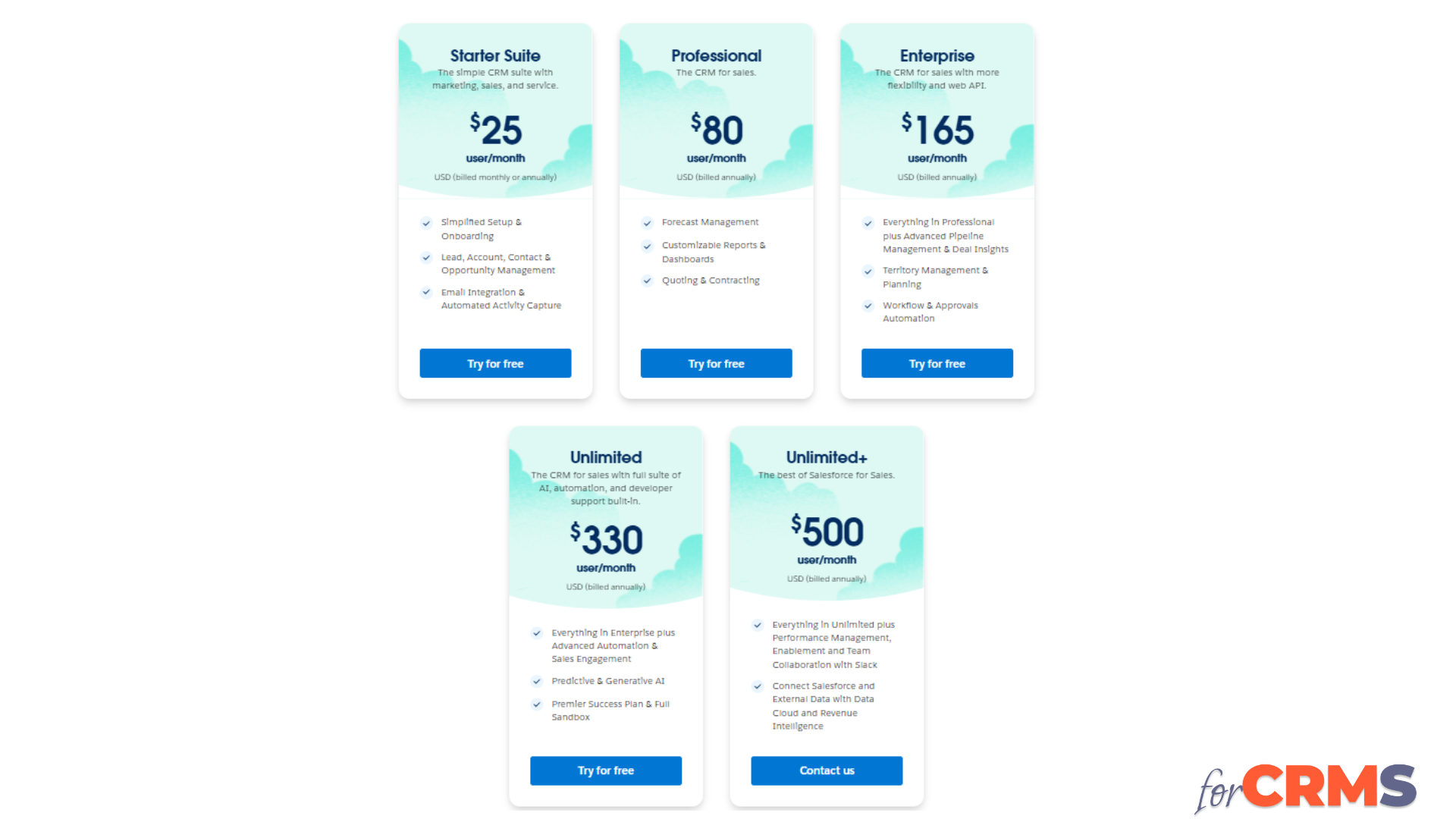
Wix

Simply put, Wix is an online website builder. It provides a dashboard for website creation, client management, and online statistics tracking, so you don't need to store website files on a local server. All Wix pricing plans offer a comprehensive website package with web hosting, themes, e-commerce tools, and much more.
Thus, you pay a monthly fee to access all the features, unlike a self-hosted solution like WordPress, where you find hosting and a domain name yourself and integrate it with WordPress.
Because of this setup, managing Wix is much easier, especially for beginners. Advanced developers also like Wix because it speeds up the development process and helps them create more websites for clients.
So, Wix operates as a Software as a Service (SaaS) product, creating an environment for self-service, where regular website owners don't necessarily need to turn to a web developer to create their website. Nevertheless, Wix also offers powerful tools for developers who create websites for clients, and even beginners can use the Wix developer network in case they want to create something more advanced on their own site.
Advantages
As a solution for creating your online store, Wix promises many good things. It's a platform that most people already consider extremely user-friendly and convenient. Additionally, Wix is also suitable for beginners. However, it's not perfect. Here are some pros and cons to consider.
- Easy-to-use backend, perfect for beginners. Ease of use is Wix's strong suit because the drag-and-drop editor is simply flawless. Wix has always been about this for website creators. Now it's integrated for e-commerce sites. There are just a few buttons on the toolbar to choose from, helping beginners tackle the most important tasks.
- Quick setup if you want to start selling as soon as possible.
- Plenty of customization options if you want to use Wix to stand out.
- Wix's app store offers access to various forms of functionality.
- Wix offers fantastic value for money as one of the most affordable stores around.
- Support for both digital and physical goods.
- No commission fees to worry about.
- Real-time calculator helps with shipping planning.
- Various advanced features on premium plans.
- E-commerce websites like Wix offer many fantastic solutions to help you make more money online. For example, one of the first solutions you'll probably use with Wix is the abandoned cart recovery feature. This allows you to automatically send emails to customers who leave items in their cart or leave the site without completing their order.
- Search engine optimization solutions available on the Wix site will help you strengthen your online presence in no time. Firstly, you know that your site is automatically optimized for mobile devices. Secondly, there are various ways to adjust your pages to include and utilize keywords.
- Users can accept multiple types of payments and access a variety of payment processors, including Stripe, Square, and PayPal.
Disadvantages
- Some issues with limited loading speed.
- Fewer tools compared to some other specialized e-commerce solutions.
- Some customization options are missing.
Prices
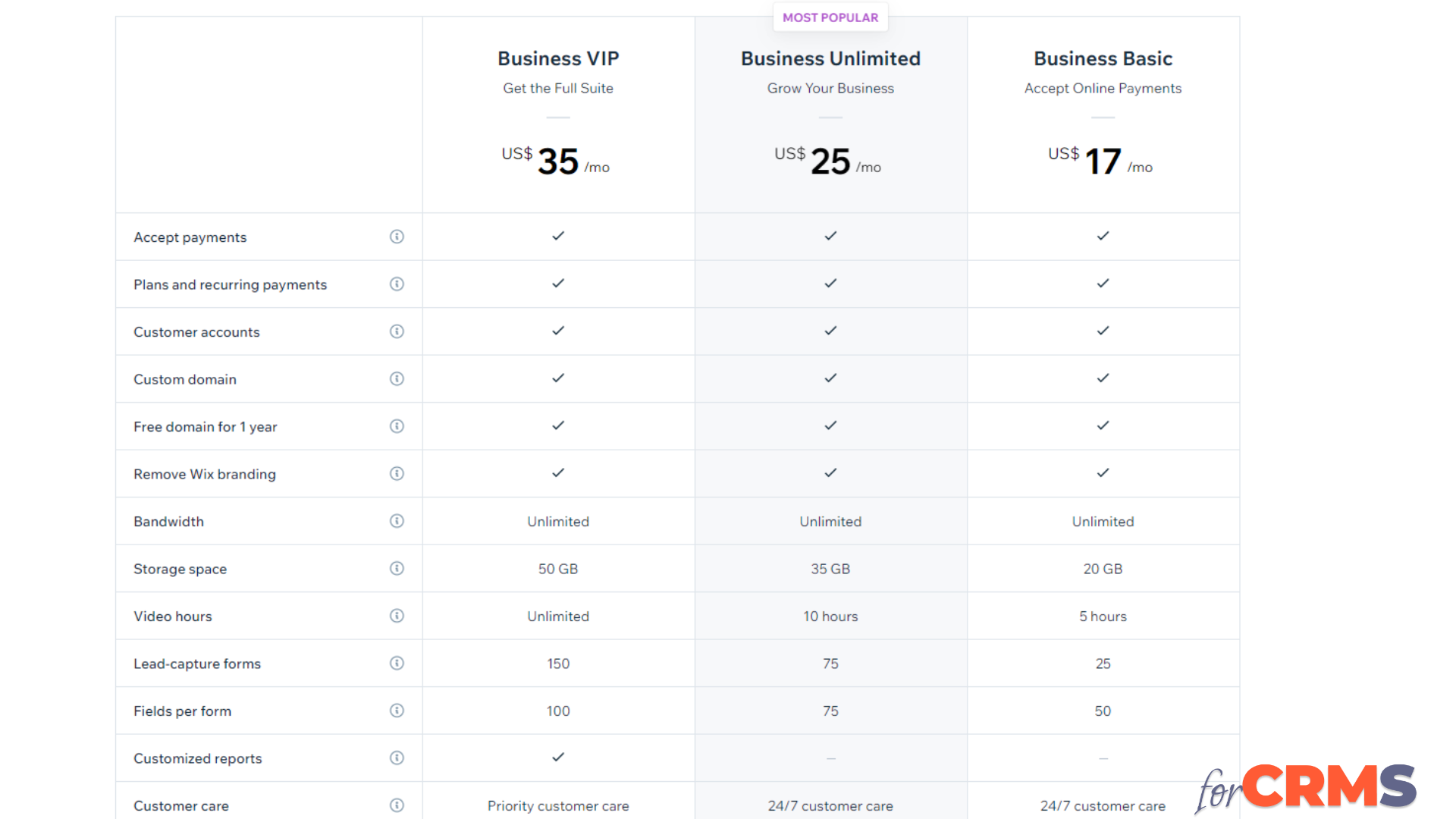
Shopify

The company Shopify was founded in 2004 in Canada. It currently ranks as the second most popular e-commerce platform globally, with 4 million active stores, second only to WooCommerce. Shopify's goal is to provide entrepreneurs with the means to easily start their business selling goods and to take it to new heights.
Shopify is a platform that provides tools for creating and managing online businesses. All the tools are consolidated in one place: the online store, inventory management, analytics, CRM, loyalty systems, multichannel marketing (selling through marketplaces, social networks, email, contextual advertising, etc.).
As of now, Shopify is the most popular e-commerce platform in the world, with over 2,000,000 stores launched worldwide.
Shopify POS allows for convenient selling and managing all accounts with a specialized application and equipment. In other words, if you are a Shopify seller with both a physical store and an online store, all your data and inventory will be synchronized, and you will be able to manage your store (or stores) from one account on any device.
Advantages
- All-in-one e-commerce solution: All essential e-commerce tools are consolidated in one place, including the online store, inventory management, CRM, loyalty systems, analytics, and advertising.
- Multichannel capabilities: Management of advertising and sales in one place, including selling through marketplaces, contextual advertising, email marketing, social media advertising, and more.
- App ecosystem for expanding functionality: The Shopify App Store offers over 4000 apps to enhance functionality. Most are paid and distributed via monthly subscriptions, but there are also free apps and those with free tiers.
- Ready integrations with payment systems and shipping services (over 100 options) for sales in any country worldwide.
- Quick store launch: High-speed store creation on Shopify is possible due to the abundance of ready-made elements, their coherence, and the ability to create a simple store using a builder (for more advanced features, a developer may be needed).
- Large developer community: Shopify has a large number of freelancers and agencies available for technical support, ensuring you won't be left without assistance.
- High-quality design templates: The Shopify template store offers very good options for store templates. Simply upload your content, and you'll have a high-quality store that looks great.
Disadvantages
- Shopify is a cloud-based platform. The website files are hosted on the platform's servers, and the store is essentially leased. Plus, not all files are accessible.
- Functionality extension is mainly achieved through paid apps, leading to an increase in the monthly subscription fee for the store. However, the good news is that you get all the essential features for free.
- On regular plans, the "Checkout" page cannot be edited (this option is only available in Shopify Plus, which costs from $2000 per month). This complicates setting up custom analytics.
- There is no access to hosting settings, and many system files are inaccessible. Therefore, the ability to optimize site performance is quite limited. Additionally, as you expand your store and install new apps, it becomes increasingly challenging to maintain a fast website.
- Achieving the minimum commission rate of 2.4-2.9% requires effort. This is only possible when using Shopify Payments, which is not available in all countries. For example, with Fondy, you would need to pay a commission of 3.8-4.4%.
Prices
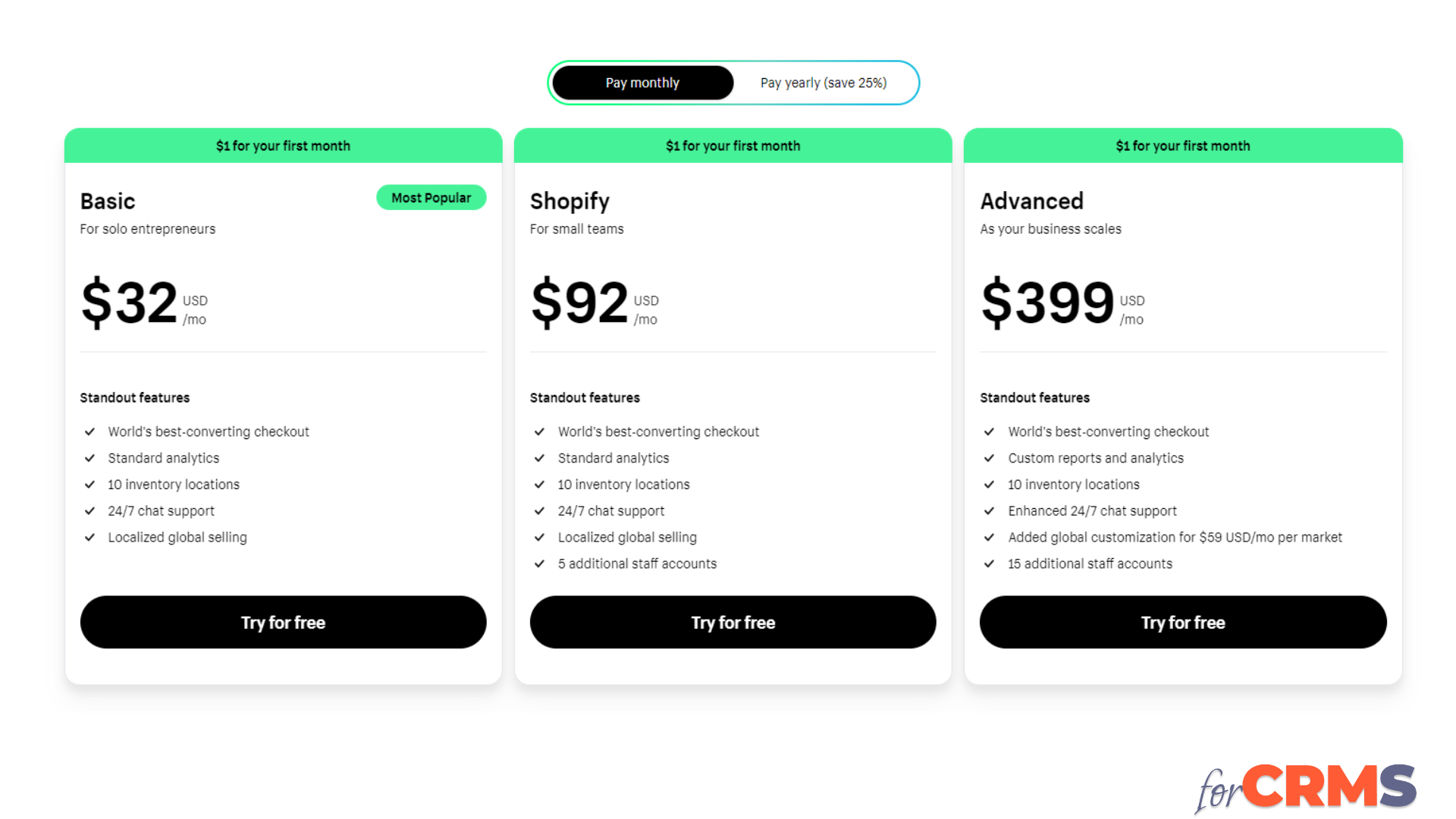
Square

Square Online is a comprehensive e-commerce platform designed to simplify every aspect of online retail for both businesses and their customers. It offers seamless integration with the Square point-of-sale system, allowing companies to manage online and in-store sales from a single unified system. The platform supports various payment methods, including Square Pay, Apple Pay, and Google Pay, and even has a built-in Afterpay feature for installment payments. Square Online is highly customizable, offering themed designs and special components for highlighting new products or sales.
It also provides real-time shipping cost calculators, options for in-store pickup, and local delivery services. The basic service is free, with transaction fees incurred for each online sale. Enhanced features and custom domains are available in paid plans.
Advantages
- Square Online comes with a website builder equipped with SEO tools. This feature allows you to create visually appealing websites optimized for search engines without requiring significant technical skills.
- The platform offers full integration with the Square point-of-sale system. This ensures that your personal and online orders, products, and inventory are synchronized, providing a unified retail experience.
- Square Online supports various fulfillment options. You can offer in-store pickup, global shipping, and even local delivery by your own staff or third-party courier services.
- The platform allows you to sell products directly through social media channels. This feature helps expand your customer reach and improve sales.
- Square Online supports various payment methods, including Google Pay, Apple Pay, Afterpay, Cash App Pay, and Square Pay. This provides flexibility and convenience for your customers during checkout.
- The software offers customizable website themes and advanced site customization features. You can connect to a custom domain, upload custom fonts, and even remove the Square branding from your site.
- Customers can create accounts to view and modify previous orders, track offers and loyalty rewards, and manage gift card balances.
- Logged-in account holders can enjoy personalized ordering, including easy reordering with three taps, product recommendations, and exclusive offers.
- Square Online comes with Square Risk Manager, which helps detect and manage payment fraud through special rules and notifications.
- The platform offers gift options and displays real-time shipping rates during checkout, enhancing the customer experience.
- You can set up subscription items on your website, helping generate recurring revenue. This is also useful for accepting ongoing donations for organizations.
Disadvantages
- Not ideal for large companies with huge transactions.
- Some issues with account stability.
- Not suitable for high-risk industries.
- High fees for large businesses.
Prices
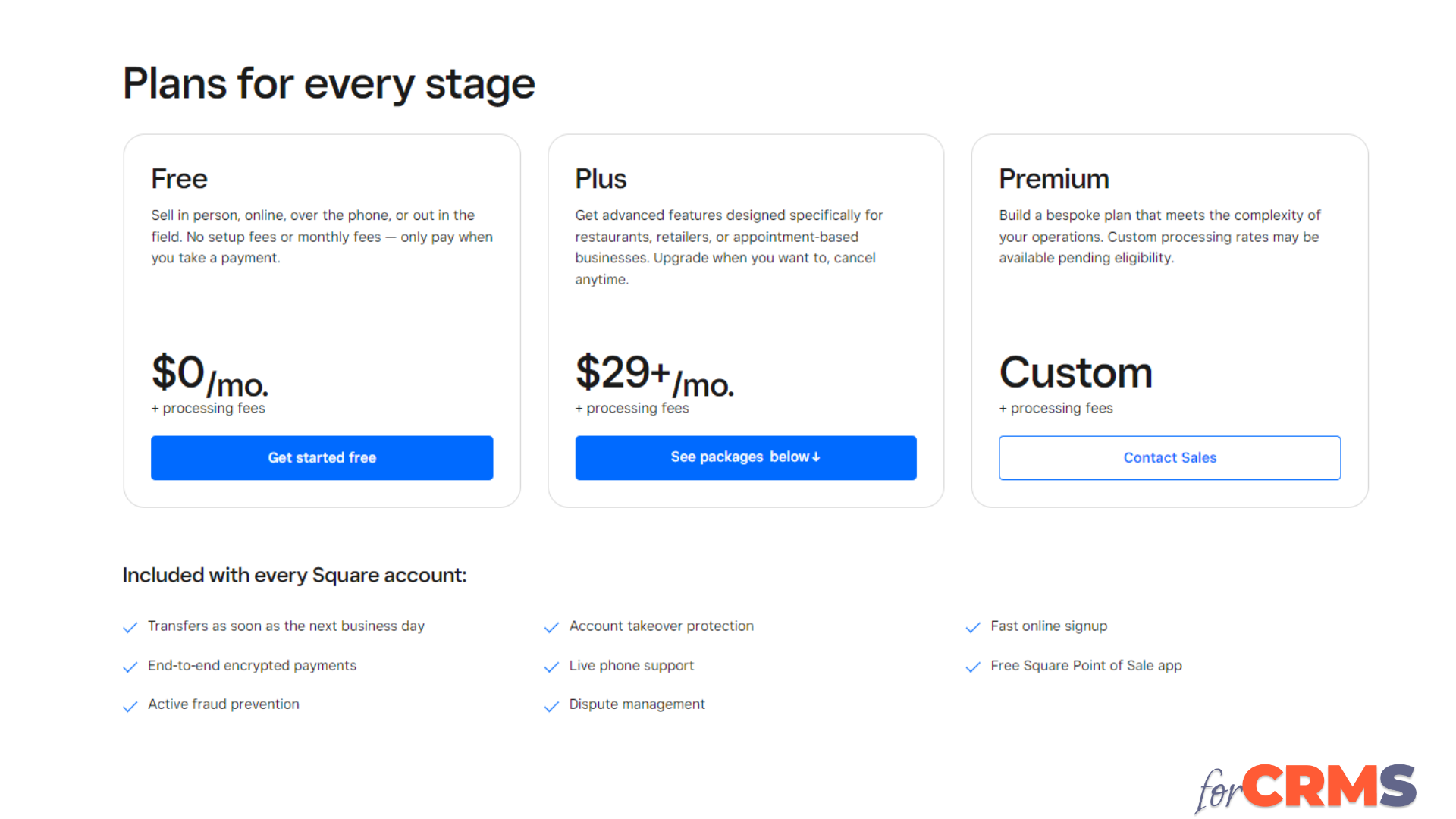
[Related Article: Field Service Software for Small Business]
BigCommerce

Bigcommerce is an online service that allows you to easily create and customize your own professional online store without knowing and writing software code or design skills. BigCommerce is a SaaS (Software as a Service) that provides easy and fast website customization on the service offered.
BigCommerce is an all-in-one e-Commerce platform and builder that provides a solution for online sales. It is a popular eCommerce software that allows businesses to easily create and manage their online stores. BigCommerce is known for its functionality, features and incorporates the benefits of e-Commerce.
BigCommerce was founded in 2009 and is one of the leading e-Commerce platforms. It offers several pricing plans, including BigCommerce Essentials and BigCommerce Enterprise, with varying levels of functionality and support.
BigCommerce Pricing also offers a variety of plans to fit the needs of any e-Commerce business, including BigCommerce Plus and the standard BigCommerce plan. It also provides an all-in-one platform with many BigCommerce features.
Advantages
- Users don't need to buy hosting, domain, or understand programming or design; it's enough to register, choose the necessary tariff, and select a suitable paid or free template for the online store.
- This platform is primarily oriented towards users who want to quickly launch a resource integrated with global payment systems and social services.
- Even in the entry-level plans, you will have access to advanced features that you won't get in most other solutions.
- BigCommerce was built from scratch to be easy to use. They used their late entry into the ecommerce market to create excellent ease of use.
- With BigCommerce, you can easily list your products on eBay, Google Shopping, Amazon, Facebook, and Instagram. In particular, B2C stores should be interested in their deep integration with social networks.
- BigCommerce does not charge transaction fees, which means you can keep most of your profits.
- BigCommerce offers a wide range of capabilities, including payment gateway integration, analytics, and a powerful app store.
- BigCommerce allows you to use various payment gateways, including PayPal and Stripe, giving you more flexibility in accepting payments.
- BigCommerce provides excellent customer support, with a team available 24/7 to help you with any issues you may encounter.
- BigCommerce offers a variety of templates and design options to help you create a professionally looking online store.
- Built-in blog that allows publishing content and interacting with the audience, helping to increase brand awareness and boost your store's traffic.
- Easily scalable, making it a great choice for companies planning to expand their online presence over time.
- BigCommerce offers a free trial version, allowing you to try out the platform before subscribing.
- Powerful shipping and tax management features, making it easy to manage the logistics of your online business.
Disadvantages
- While BigCommerce offers a range of pricing plans, the platform may be more expensive compared to other ecommerce platforms, such as Shopify.
- Bandwidth limitations in BigCommerce can be a problem for enterprises with high levels of traffic.
- BigCommerce offers not as many third-party integrations as some of its competitors.
- The BigCommerce page builder can be challenging to use, especially for those with no design experience.
Prices
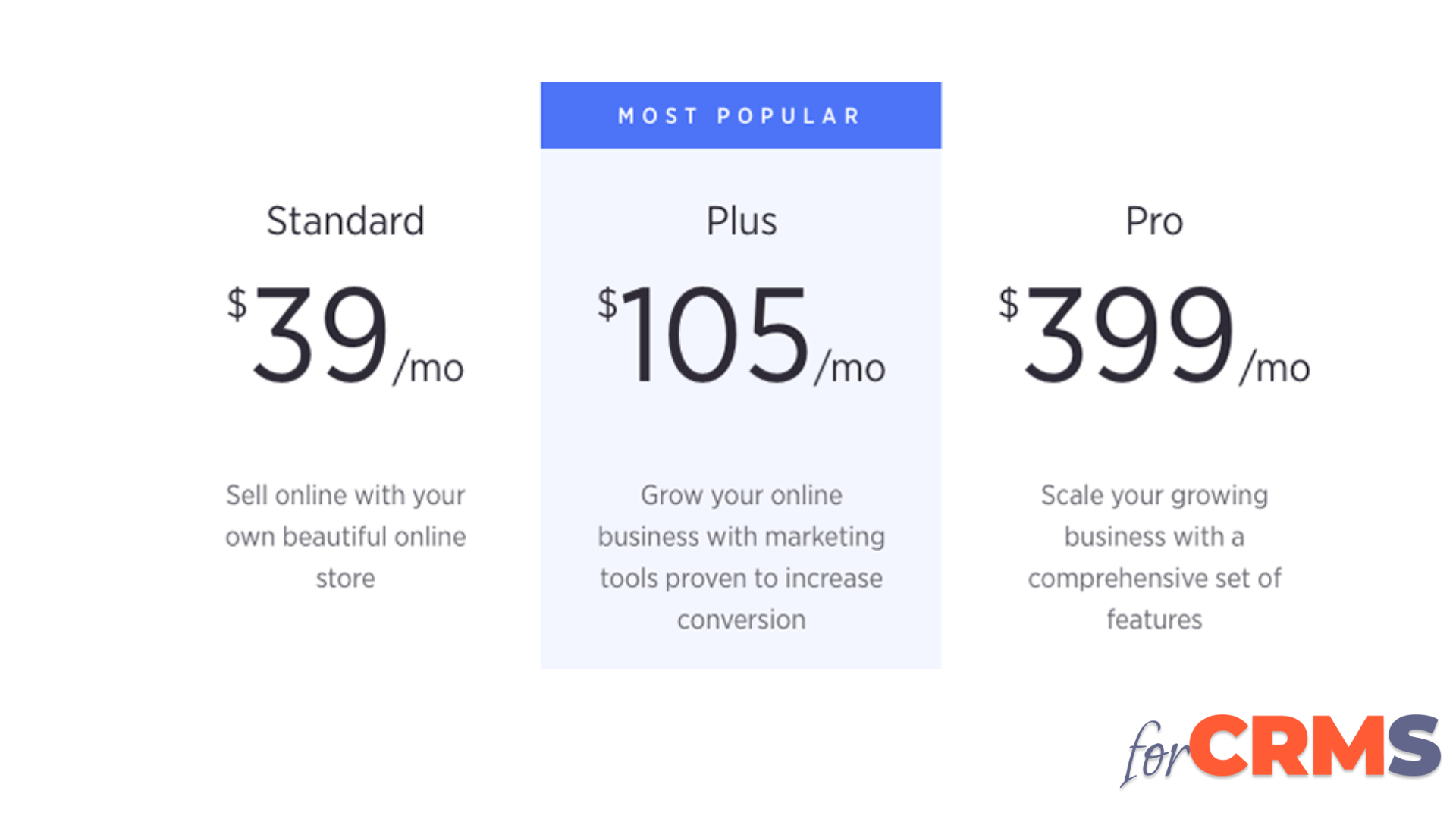
[Related Article: Top 10 Free HubSpot Apps in 2024]















